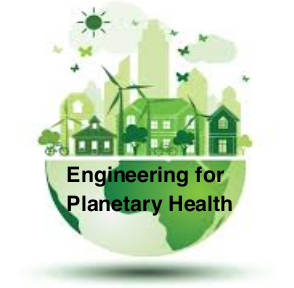ENVIRONMENTAL AND ENERGY SYSTEMS

The concept of planetary health is rooted in understanding the interdependencies of natural and built systems and the human experience. The Engineering for Planetary Health theme area at CSU is centered around environmental and energy systems that are both natural and engineered, are closely linked and disproportionately contribute to the state of planetary health. The objective of the Environmental and Energy Systems Focus Area at Colorado State University is to research solutions to global problems at this critical interface and to train the next generation of engineers to continue this pursuit.Programs leading to MS and PhD degrees in the Engineering for Planetary Health theme area include course work and training in air quality engineering, urban water systems, energy-water nexus technologies, water treatment and reuse, modern oil and gas issues and policy, large dataset analytics and waste containment for an increasingly polluted and populated planet. Students are encouraged to take advantage of the multitude of courses across the CSU campus that relate to environmental and energy systems including classes taught in the Colleges of Agriculture, Liberal Arts, Business and Natural Resources.
As shown below, researchers in the Department of Civil and Environmental Engineering at CSU contribute to the Environmental and Energy Systems Focus Area and conduct research in a broad array of areas that support the mission of Engineering for Planetary Health.
Water System Efficiency and Resource Recovery
- Manage urban water systems for ecosystem health and human needs
- Design novel and efficient treatment technologies for water, wastewater and stormwater
- Develop alternate water sources through advanced treatment and reuse strategies
- Determine effective nutrient recovery and removal strategies
Optimizing Alternative Energy Systems
- Develop and optimize waste to energy systems and waste valorization technologies
- Minimize barriers to the application of bioenergy systems
- Optimize extraction of wind energy
- Improve energy efficiency and generation of water and wastewater treatment
- Assist household energy transitions in the developing world
- Utilize low cost sensors within distributed environmental sensing networks
- Manage large data sets for solving difficult energy/environment problems
- Exploit machine learning technologies to develop and optimize efficient and low impact energy/environment systems
Engineered Systems for Climate Change Adaptation
- Develop environmental infrastructure that supports resilient climate change adaptation strategies
- Model climate change impacts on urban water systems
- Develop climate change adaptation strategies for critical military assets
- Develop cost effective and practical groundwater & sediment remediation strategies
- Develop low-cost technologies for treating emerging contaminants
- Design and optimize waste containment systems
- Understand contaminant exposure pathways in complex human/environment systems
- Employ real-time monitoring systems to characterize and predict contamination events
- Develop technologies for preventing mine wastes from polluting natural waters
- Understand water, soil and built environment impacts on indoor air pollution